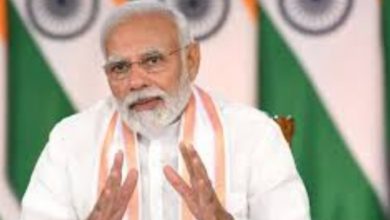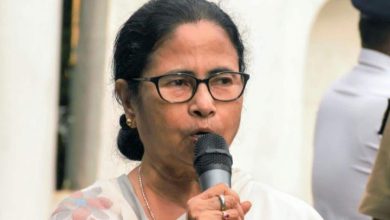Cuts in Britain could cause a Covid-19 data drought

The British government on Friday shut down or scaled back a number of its Covid-19 surveillance programs, curtailing the collection of data that the United States and many other countries had come to rely on to understand the threat posed emerging variants and the effectiveness of vaccines. Denmark, too, renowned for insights from its comprehensive tests, has drastically cut back on its virus tracking efforts in recent months.
As more countries loosen their policies toward living with Covid-19 rather than snuffing it out, health experts worry that monitoring systems will become weaker, making it more difficult to predict new surges and to make sense of emerging variants.
“Things are going to get harder now,” said Samuel Scarpino, a managing director at the Rockefeller Foundation’s Pandemic Prevention Institute. “And right as things get hard, we’re dialing back the data systems.”
Since the alpha variant emerged in fall 2020, Britain has served as a bellwether, tracking that variant as well as delta and omicron before they arrived in the US After a slow start, US genomic surveillance efforts have steadily improved with a modest increase in funding.
“This might actually put the US in more of a leadership position,” said Krian Andersen, a virus expert at Scripps Research Institute in La Jolla, California.
At the start of the pandemic, Britain was especially well prepared to set up a world-class virus tracking program. The country was already home to many experts on virus evolution, it had large labs ready to sequence viral genes, and it could link that sequencing to electronic records from its National Health Service.
In March 2020, British researchers created a consortium to sequence as many viral genomes as they could lay hands on. Some samples came from tests that people took when they felt ill, others came from hospitals, and still others came from national surveys.
That last category was especially important, experts said. testing hundreds of thousands of people at random each month, the researchers could detect new variants and outbreaks among people who did not even know they were sick, rather than waiting for tests to come from clinics or hospitals.
“The community testing has been the most rapid indicator of changes to the epidemic, and it’s also been the most rapid indicator of the appearance of new variants,” said Chrophe Fraser, a public health researcher at the University of Oxford. “It’s really the key tool.”
late 2020, Britain was performing genomic sequencing on thousands of virus samples a week from surveys and tests, supplying online databases with more than half of the world’s coronavirus genomes. That December, this data allowed researchers to identify alpha, the first coronavirus variant, in an outbreak in southeastern England.
A few other countries stood out for their efforts to track the virus’s evolution. Denmark set up an ambitious system for sequencing most of its positive coronavirus tests. Israel combined viral tracking with aggressive vaccination, quickly producing evidence last summer that the vaccines were becoming less effective — data that other countries leaned on in their decision to approve boosters.
But Britain remained the exemplar in not only sequencing viral genomes, but combining that information with medical records and public health research to make sense of the variants.
“The U.K. really set itself up to give information to the whole world,” said Jeffrey Barrett, the former director of the COVID-19 Genomics Initiative at the Wellcome Sanger Institute in Britain.
Even in the past few weeks, Britain’s surveillance systems were giving the world crucial information about the BA.2 subvariant of omicron. British researchers established that the variant does not pose a greater risk of hospitalization than other forms of omicron but is more transmissible.
On Friday, two of the country’s routine virus surveys were shut down and a third was scaled back, baffling Fraser and many other researchers, particularly when those surveys now show that Britain’s COVID-19 infection rates are estimated to have reached a record high: 1 in 13 people. The government also stopped paying for free tests and either canceled or paused contact-tracing apps and sewage sampling programs.
“I don’t understand what the strategy is, to put together these very large instruments and then dismantle them,” Fraser said.
The cuts have come as Prime Miner Boris Johnson has called for Britain to “learn to live with this virus.” When the government released its plans in February, it pointed to the success of the country’s vaccination program and the high costs of various virus programs. Although it would be scaling back surveillance, it said, “the government will continue to monitor cases, in hospital settings in particular, including using genomic sequencing, which will allow some insights into the evolution of the virus.”
It is true that life with COVID-19 is different now than it was back in the spring of 2020. Vaccines drastically reduce the risk of hospitalization and death — at least in countries that have vaccinated enough people. Antiviral pills and other treatments can further blunt COVID-19’s devastation, although they are still in short supply in much of the world.
Supplying free tests and running large-scale surveys is expensive, Barrett acknowledged, and after two years, it made sense that countries would look for ways to curb spending. “I do understand it’s a tricky position for governments,” he said.
But he expressed worry that cutting back too far on genomic surveillance would leave Britain unprepared for a new variant. “You don’t want to be blind on that,” he said.
With a reduction in testing, Steven Paterson, a genetic at the University of Liverpool, pointed out that Britain will have fewer viruses to sequence. He estimated the sequencing output could drop 80%.
“Whichever way you look at it, it’s going to lead very much to a degradation of the insight that we can have, either into the numbers of infections or our ability to spot new variants as they come through,” Paterson said.
Experts warned that it will be difficult to restart surveillance programs of the coronavirus, known formally as SARS-CoV-2, when a new variant emerges.
“If there’s one thing we know about SARS-CoV-2, it’s that it always surprises us,” said Paul Elliott, a public health researcher at Imperial College London and a lead investigator on one of the community surveys being cut. “Things can change really, really quickly.”





